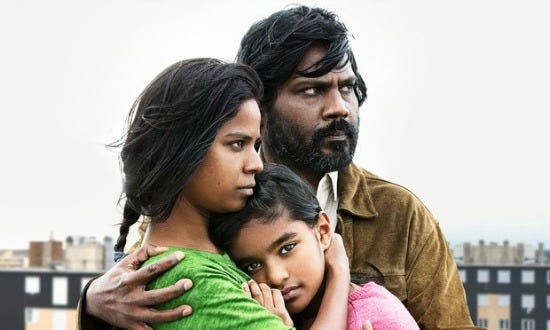Dheepan

"Dheepan" won the Palme d'Or at the 2015 Cannes Film Festival, and deservedly so. It's a French film that examines the lives of a family of refugees who fled to Paris, an issue very much top of mind these days. Director Jacques Audiard ("Rust and Bone"), who co-wrote the screenplay with Thomas Bidegain and Noé Debr, gives an empathetic look at people from an exotic land struggling to assimilate in the West.
Things would be hard enough for Dheepan (Jesuthasan Antonythasan), his wife Yalini (Kalieaswari Srinivasan) and their 9-year-old daughter, Illayaal, (Claudine Vinasithamb). They're destitute people from warn-torn Sri Lanka, where the Tamil Tigers have fought a decades-long insurgency, and speak only a few words of French. They're placed in a public-assistance slum where drug dealers control every walk of life.
But there's an additional challenge for this family: They're not who they say they are.
Dheepan was actually a Tamil fighter who deserted after his real family was killed. Enlisting a random young woman in a refugee camp, they find an unwanted girl and together pose as a dead family, using their identification and concocted stories to gain access to French sanctuary.
So in addition to having to adapt to an alien culture and language, they're also negotiating a delicate dance as strangers who have to pass themselves off as loved ones. What makes the story so compelling is that they start off as an ersatz family and gradually evolve into a real one.
Dheepan is sober and serious, a man foreign to smiles and laughter. At one point he asks Yalini if she understands French jokes. She, naturally more sunny, tells him that he doesn't get their jokes because he has no sense of humor to begin with.
He is given a job as caretaker for a cluster of buildings — part janitor, part postmaster, part engineer. He takes his duties seriously but is constantly harassed by the criminals who truly run the place, making him wait outside before he can go in and sweep up their garbage. They dismiss him as the funny little foreign man, not knowing he's a trained soldier who's killed more men than all of them combined.
For her part, Yalini is enlisted to work for an old man (Faouzi Bensaïdi) who lives in the rougher building across the way, where Dheepan has been warned not to go. The man's nephew, Brahim (Vincent Rottiers), is soon released from prison and takes up residence in the apartment, wearing an ankle monitor while he starts directing the criminal activity in the neighborhood. They form an odd bond, since Yalini labors to forge one with her supposed husband.
Meanwhile, young Illayaal struggles in school, set apart by the language barrier and the brush-off from some mean girls. But she slowly begins to transition to a healthier state, in many ways better than her "parents."
This is a very emotionally delicate tale, and the cast and crew pull off a remarkable feat in making all of the major characters relatable, even if their cultural background or motives might seem strange to us. Yalini gradually breaks out of the shell of housework and child-rearing women of her background are expected to stick to. And Dheepan confronts some of the chauvinistic and militaristic attitudes of his past with newfound disdain.
"Did you end up believing this story?" Yalini taunts him at one point, after a brief romantic flowering between the two has eroded into despair and strife.
"Dheepan" is a story about the stories we tell ourselves, and finding that the greatest lies can become truth if we embrace them long and hard enough.



